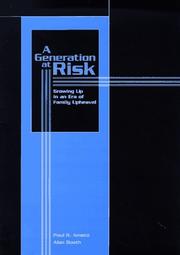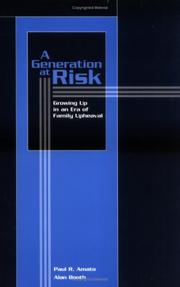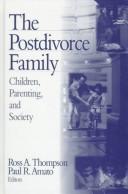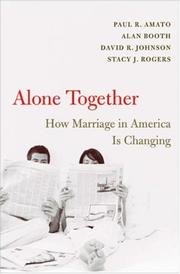| Listing 1 - 10 of 13 | << page >> |
Sort by
|

ISBN: 0674292839 Year: 1997 Publisher: Cambridge,Mass. Harvard University Press
Abstract | Keywords | Export | Availability | Bookmark
 Loading...
Loading...Choose an application
- Reference Manager
- EndNote
- RefWorks (Direct export to RefWorks)
Based on a unique fifteen-year study begun in 1980, the book considers parents' socioeconomic resources, their gender roles and relations, and the quality and stability of their marriages. It then examines children's relations with their parents, their intimate and broader social affiliations, and their psychological well-being. The authors provide rare insight into how both familial and historical contexts affect young people as they make the transition to adulthood. (Harvard UP)
Sociology of the family. Sociology of sexuality --- #SBIB:AANKOOP --- #SBIB:316.356.2H2220 --- Gezinssociologie: gezinsrelaties: algemeen --- Child rearing --- Families --- Parent and child --- Child raising --- Children --- Raising of children --- Rearing of children --- Training of children --- Child and parent --- Children and parents --- Parent-child relations --- Parents and children --- Development and guidance --- Management --- Training --- Child care --- Children and adults --- Interpersonal relations --- Parental alienation syndrome --- Sandwich generation

ISBN: 0674003985 Year: 2000 Publisher: Cambridge (Mass.) Harvard University Press
Abstract | Keywords | Export | Availability | Bookmark
 Loading...
Loading...Choose an application
- Reference Manager
- EndNote
- RefWorks (Direct export to RefWorks)
Book
ISBN: 0674020197 Year: 1997 Publisher: Cambridge, Mass. ; London : Harvard University Press,
Abstract | Keywords | Export | Availability | Bookmark
 Loading...
Loading...Choose an application
- Reference Manager
- EndNote
- RefWorks (Direct export to RefWorks)
Just what do we know about the current generation of young Americans? So little it seems that we have dubbed them Generation X. Coming of age in the 1980s and '90s, they hail from families in flux, from an intimate landscape changing faster and more profoundly than ever before. This book is the first to give us a clear, close-up picture of these young Americans and to show how they have been affected and formed by the tremendous domestic changes of the last three decades. How have members of this generation fared at school and at work, as they have moved into the world and formed families of their own? Do their struggles or successes reflect the turbulence of their time? These are the questions A Generation at Risk answers in comprehensive detail. Based on a unique fifteen-year study begun in 1980, the book considers parents' socioeconomic resources, their gender roles and relations, and the quality and stability of their marriages. It then examines children's relations with their parents, their intimate and broader social affiliations, and their psychological well-being. The authors provide rare insight into how both familial and historical contexts affect young people as they make the transition to adulthood. Perhaps surprising is the authors' finding that, in this era of shifting gender roles, children who grow up in traditional father-breadwinner, mother-homemaker families and those in more egalitarian, role-sharing families apparently turn out the same. Also striking are the beneficial influence of parental education on children and the troubling long-term impact of marital conflict and divorce--an outcome that prompts the authors to suggest policy measures that encourage marital quality and stability.Table of Contents: Family, Social Change, and Transition to Adulthood Study Design, Measures, and Analysis Relationships with Parents Intimate Relationships Social Integration Socioeconomic Attainment Psychological Well-Being Conclusions, Implications, and Policy Recommendations Appendix: Tables References IndexReviews of this book: An important new book.Paul Amato and Alan Booth painstakingly analyze data from a large national sample of families, seeking especially to isolate the independent effects of divorce on children from the effects of preexisting marital conflict. The results call into question the rationalizations of our high divorce rate.Amato and Booth estimate that at most a third of divorces involving children are so distressed that the children are likely to benefit. The remainder, about 70%, involve low-conflict marriages that apparently harm children much less than do the realities of divorce.This remarkably countercultural conclusion will provoke many predictable reminders about toxic marriages and many repetitions of the familiar bromide that marital unhappiness, not 'divorce per se' is the real problem. But because of this book, we also will have a more informed discussion of the moral dimensions of the decision to divorce. Amato and Booth have helped us to recognize more clearly the potential conflicts between parental responsibility and adult desires for freedom, romance, sexual gratification and self-actualization.--Norval D. Glenn and David Blankenhorn, Los Angeles TimesReviews of this book: [This] longitudinal study of the consequences of family instability and change in the USA.focused upon two generations--the parents and their offspring--and looked at how the relations between them changed over the survey time.[The] study provides an excellent opportunity to test some favorite popular assumptions--such as whether witnessing unhappiness in the parental home would lead to the inability to have happy relationships in one's own home. Or does having a 'liberated' or non-traditional mother harm children's development? The advantage of a longitudinal study is that we can examine these differences on the same people over time.This study would be of relevance to youth researchers interested in the 'life course' perspective as it provides a range of data and information of a kind which is seldom normally available.This is a well organized and documented study discussing quantitative findings in an accessible and enlightening way.--Claire Wallace, Journal of Youth StudiesReviews of this book: A Generation at Risk summarizes [Amato and Booth's] pioneering longitudinal study which, between 1980 and 1992, interviewed a representative sample of 1,193 married persons with children. Amato and Booth also interviewed the adult children in 1992 and 1995. The book uses the life-course perspective and considers the impact of changing historical contexts on these families. It is intended for professionals, although the conclusions are vital to anyone who has even a passing interest in changes in contemporary families.This landmark work will frame scholarly discussions of parent-child dynamics for many years and belongs in every major library.--Larry R. Peterson, HistoryReviews of this book: This important and disturbing book.carefully examines how parents' socioeconomic resources, gender roles, and degree of marital happiness affect their children's lives.It strikes a resounding note of alarm at recent trends in American family life. The work is based on the results of a finely drawn 15-year study of a nationwide sampling of married couples and their adult offspring. There are no glittering generalizations here; Amato and Booth provide rich contextual detail and easily readable tables as they consider, for example, the effect of maternal employment on daughters' social integration (largely positive).Public libraries should not be deterred by this book's scholarly presentation: it speaks to us all.--Ellen Gilbert, Library JournalReviews of this book: What are the long-term effects on children of the great changes in the family that have occurred over the past several decades?.Paul Amato and Alan Booth's impressive study is one of the first to provide us with long-term data on this generation.Theirs is one of the few longitudinal surveys to measure marital quality and then to follow offspring for a long period, during which some of the parents divorce.A Generation at Risk is an important addition to the literature on the long-term effects of families on their children.--Andrew J. Cherlin, American Journal of Sociology
Child rearing --- Families --- Parent and child
Book
Abstract | Keywords | Export | Availability | Bookmark
 Loading...
Loading...Choose an application
- Reference Manager
- EndNote
- RefWorks (Direct export to RefWorks)
Digital
ISBN: 9780674020191 Year: 2021 Publisher: Cambridge, Mass. Harvard University Press
Abstract | Keywords | Export | Availability | Bookmark
 Loading...
Loading...Choose an application
- Reference Manager
- EndNote
- RefWorks (Direct export to RefWorks)

ISBN: 0761914897 0761914900 1452263752 1322417504 9781452263755 9781452234038 1452234035 9780761914891 9780761914907 Year: 1999 Publisher: Thousand Oaks, Calif. Sage
Abstract | Keywords | Export | Availability | Bookmark
 Loading...
Loading...Choose an application
- Reference Manager
- EndNote
- RefWorks (Direct export to RefWorks)
Integrating the empirical research and policy perspectives of scholars in various disciplines, this volume analyses and reflects on the issues surrounding divorce and the implications for public policy.
Sociology of the family. Sociology of sexuality --- #PBIB:2002.1 --- Divorce --- Children of divorced parents --- Divorced parents --- Families --- Parenting, Part-time --- Co-parenting --- Parenting, Shared --- Part-time parenting --- Shared parenting --- Joint custody of children --- Parenting --- Single parents --- Family --- Family life --- Family relationships --- Family structure --- Relationships, Family --- Structure, Family --- Social institutions --- Birth order --- Domestic relations --- Home --- Households --- Kinship --- Marriage --- Matriarchy --- Parenthood --- Patriarchy --- Divorced people --- Parents --- Divorced parents' children --- Adult children of divorced parents --- Children of single parents --- Broken homes --- Psychological aspects --- Social aspects --- Social conditions --- Children of divorced parents. --- Divorce. --- Divorced parents. --- Law and legislation. --- United States. --- Sociology & Social History --- Social Sciences --- Family & Marriage

ISBN: 0674020189 9780674020184 0674022815 9780674022812 9780674032170 0674032179 Year: 2009 Publisher: Cambridge, MA
Abstract | Keywords | Export | Availability | Bookmark
 Loading...
Loading...Choose an application
- Reference Manager
- EndNote
- RefWorks (Direct export to RefWorks)
Based on two studies of marital quality in America twenty years apart, Alone Together shows that while the divorce rate has leveled off, spouses are spending less time together. The authors argue that marriage is an adaptable institution, and in accommodating the changes that have occurred in society, it has become a less cohesive, yet less confining arrangement.
Marriage --- Married life --- Matrimony --- Nuptiality --- Wedlock --- Love --- Sacraments --- Betrothal --- Courtship --- Families --- Home --- Honeymoons --- History.
Digital
ISBN: 9780674020184 9780674032170 Year: 2009 Publisher: Cambridge, Mass. Harvard University Press
Abstract | Keywords | Export | Availability | Bookmark
 Loading...
Loading...Choose an application
- Reference Manager
- EndNote
- RefWorks (Direct export to RefWorks)
Book
ISBN: 3319083082 3319083074 Year: 2015 Publisher: Cham : Springer International Publishing : Imprint: Springer,
Abstract | Keywords | Export | Availability | Bookmark
 Loading...
Loading...Choose an application
- Reference Manager
- EndNote
- RefWorks (Direct export to RefWorks)
The widening gap between the rich and the poor is turning the American dream into an impossibility for many, particularly children and families. And as the children of low-income families grow to adulthood, they have less access to opportunities and resources than their higher-income peers--and increasing odds of repeating the experiences of their parents. Families in an Era of Increasing Inequality probes the complex relations between social inequality and child development and examines possibilities for disrupting these ongoing patterns. Experts across the social sciences track trends in marriage, divorce, employment, and family structure across socioeconomic strata in the U.S. and other developed countries. These family data give readers a deeper understanding of how social class shapes children's paths to adulthood and how those paths continue to diverge over time and into future generations. In addition, contributors critique current policies and programs that have been created to reduce disparities and offer suggestions for more effective alternatives. Among the topics covered: Inequality begins at home: the role of parenting in the diverging destinies of rich and poor children. Inequality begins outside the home: putting parental educational investments into context. How class and family structure impact the transition to adulthood. Dealing with the consequences of changes in family composition. Dynamic models of poverty-related adversity and child outcomes. The diverging destinies of children and what it means for children's lives. As new initiatives are sought to improve the lives of families and children in the short and long term, Families in an Era of Increasing Inequality is a key resource for researchers and practitioners in family studies, social work, health, education, sociology, demography, and psychology.
Developmental psychology. --- Social policy. --- Family. --- Developmental Psychology. --- Social Policy. --- National planning --- State planning --- Economic policy --- Family policy --- Social history --- Development (Psychology) --- Developmental psychobiology --- Psychology --- Life cycle, Human --- Families --- Equality. --- Economic aspects. --- Egalitarianism --- Inequality --- Social equality --- Social inequality --- Political science --- Sociology --- Democracy --- Liberty --- Economic conditions --- Families. --- Families—Social aspects. --- Family --- Family life --- Family relationships --- Family structure --- Relationships, Family --- Structure, Family --- Social institutions --- Birth order --- Domestic relations --- Home --- Households --- Kinship --- Marriage --- Matriarchy --- Parenthood --- Patriarchy --- Social aspects --- Social conditions

ISBN: 0674022815 9780674022812 Year: 2007 Publisher: Cambridge Harvard university press
Abstract | Keywords | Export | Availability | Bookmark
 Loading...
Loading...Choose an application
- Reference Manager
- EndNote
- RefWorks (Direct export to RefWorks)
Marriage --- #SBIB:316.356.2H1134 --- #SBIB:316.356.2H2222 --- 316.356.2 <73> --- 316.356.2 <73> Gezinssociologie--Verenigde Staten van Amerika. VSA. USA --- Gezinssociologie--Verenigde Staten van Amerika. VSA. USA --- Hedendaagse gezinsstudies: Noord-Amerika --- Gezinssociologie: man-vrouw relaties
| Listing 1 - 10 of 13 | << page >> |
Sort by
|

 Search
Search Feedback
Feedback About UniCat
About UniCat  Help
Help News
News